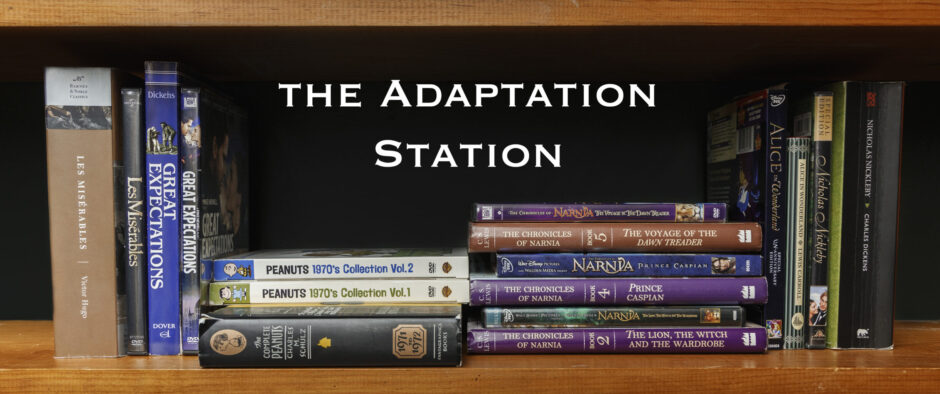As I’ve mentioned on this blog before, not one but two movie adaptations of Jane Austen’s Emma came out in 1996. This makes them rather a pain to talk about since while both follow the book’s plot fairly closely, they take very different approaches, and you don’t want to get them mixed up. Since one was made for cinemas by Miramax and the other for television by the BBC, I could call them Cinema Emma 1996 and TV Emma 1996 or Miramax Emma 1996 and BBC Emma 1996, but that strikes me as unwieldly. For the purposes of this post, I’m going to call them 1996 A and 1996 B. Hopefully, that’ll work.
Emma (1996) A

This Emma, written and directed by Douglas McGrath has the greatest cast, on the whole if not in every single part, that I’ve seen, starting with Gwyneth Paltrow as the lead. With her sometimes friendly, sometimes impishly provocative smile, she manages to make the notorious antiheroine as charming as she is frustrating.[1]I’m not sure why Mr. Darcy of Pride and Prejudice fame doesn’t get as much as flack as Emma. Both characters are good looking and filthy stinking rich, take good care of their family … Continue reading Is she maybe a little too likeable in fact?
I say, nay.
Well, OK, maybe a little bit.
The script does pull a few punches. This Emma doesn’t flirt with Frank Churchill (Ewan McGregor) after she’s decided she doesn’t really want to marry him and should set him up with someone else. It’s also he who suggests the idea to her that there may be a scandalous relationship between Jane Fairfax (Polly Walker) and her best friend’s husband, Mr. Dixon. [2]I suspect both of those changes were made more for the purposes of tightening the pacing than sanitizing the character. When manipulating Harriet Smith (Toni Collette) into turning down the lowly Robert Martin (Edward Woodall), she no longer says that they could no longer be friends if she accepted him. And her initial motives for befriending Harriet is framed less in terms of her being bored and lonely in the absence of her recently married governess, Mrs. Weston (Greta Scacchi), as in other adaptations, than because she wishes to mentor someone just as Mrs. Weston did her.
But I’d argue that more generous motive was always in the book even if adaptations haven’t always emphasized it (reasonably enough.) While Emma does think of Harriet in dehumanizing terms in Austen, calling her “exactly the something which her home required.” (Emma’s home, that is.) But part of Harriet’s appeal for her is that she’s “one to whom she could be useful. For Mrs. Weston, there was nothing to be done; for Harriet, everything.” Condescending to her social inferiors, Emma certainly is. (Jane Austen, in her classism, took the position that she could be nothing else.) But she’s also genuinely altruistic in her self-serving way. A scene of her visiting a poor sick woman might seem like it was invented to keep her from being too unlikeable, but it actually comes straight from the book, and this is the only Emma movie to include it. This adaptation understands that while Emma cares too much about herself, she does care very much about others, including her social inferiors. It does the best job of dramatizing her guilt over raising Harriet’s hopes for a proposal from Mr. Elton (Alan Cumming) only to dash them.
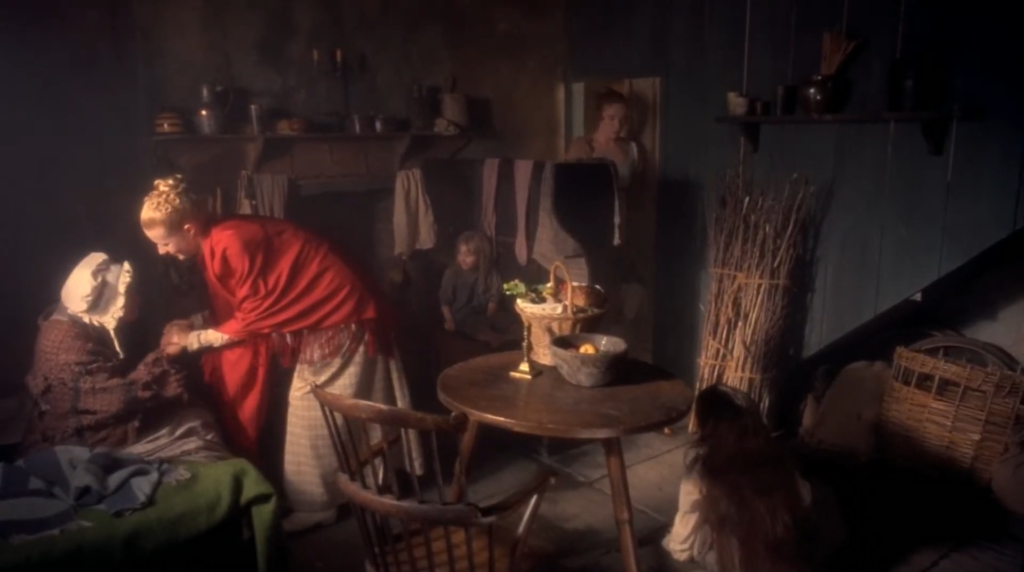
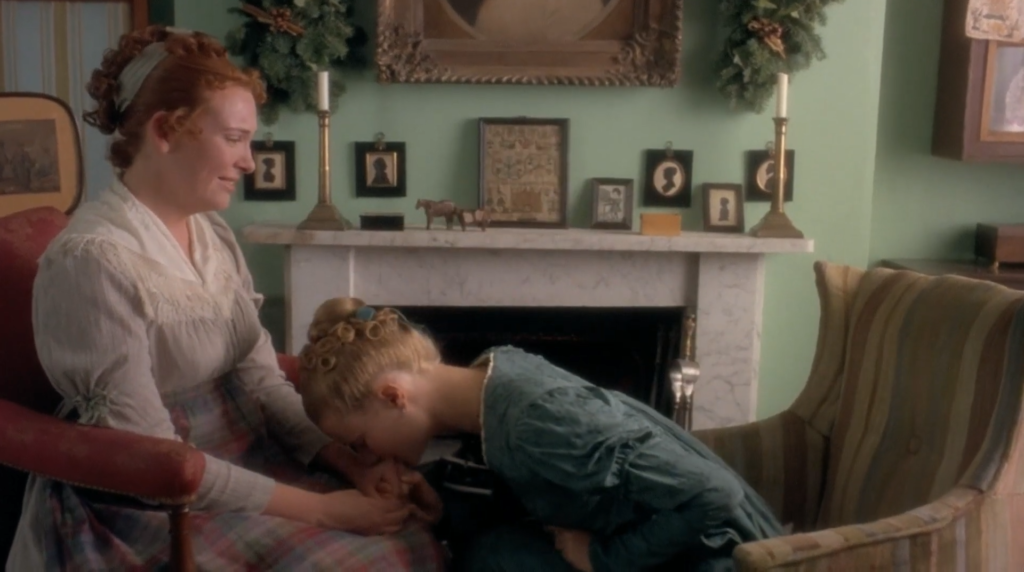
And it’s not like it shies away from Emma’s faults in general. She’s still childishly eager to rub it in Mr. Knightley (Jeremy Northam)’s face when it looks (to her) like he’s been proved wrong and she right about Mr. Elton. The detail of her nearly falling off the bandwagon right after she renounces matchmaking is included. Her hypocrisy is highlighted in a hilarious montage of her eagerly checking the mail for an invitation while insisting she’d never accept it and her resentment of Jane Fairfax becomes a great running joke. A good portion of the laughter this movie generates is at her expense. [3]Does all this comedy undermine the story’s moral seriousness? I’ll argue not later.
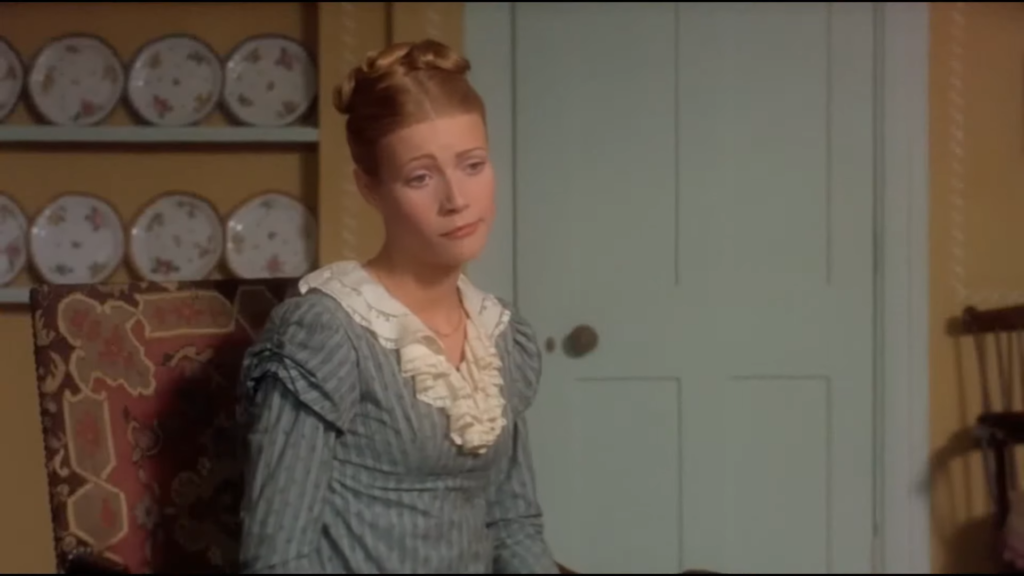
But back to the cast. Jeremy Northam is the warmest and most appealing Mr. Knightley. I wish he had more competition to make his victory more impressive.
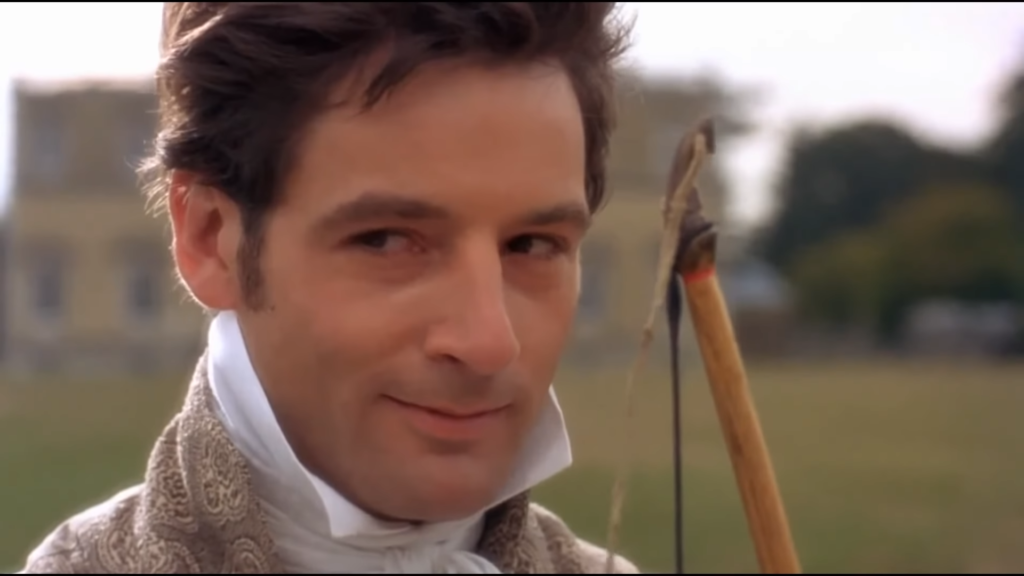
Juliet Stevenson is the funniest Mrs. Elton, and she does have some real competition for that honor.
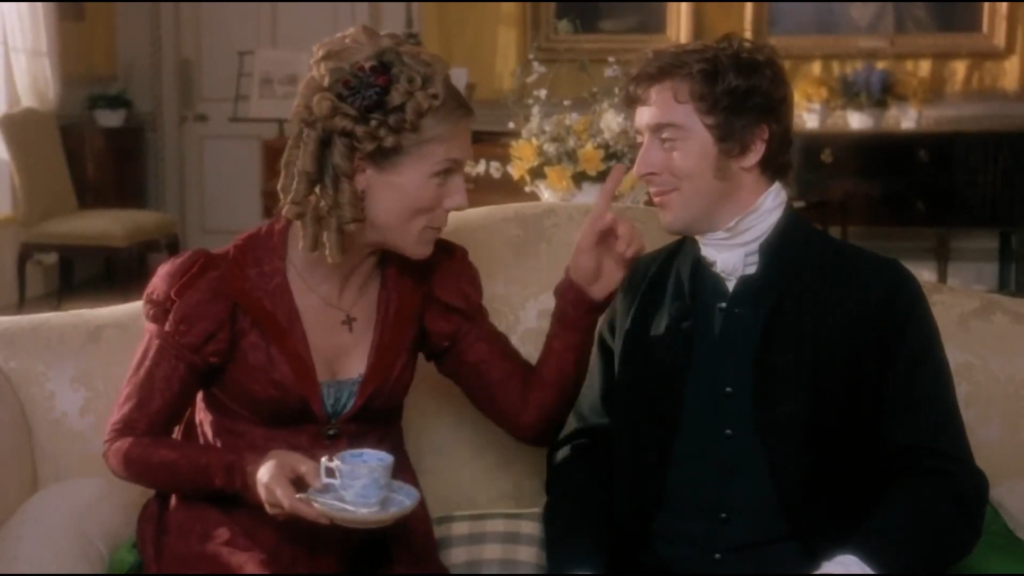
Toni Collette is both funny and endearing as the ditzy Harriet. It’s easy to empathize with Emma’s patronizing affection for her.
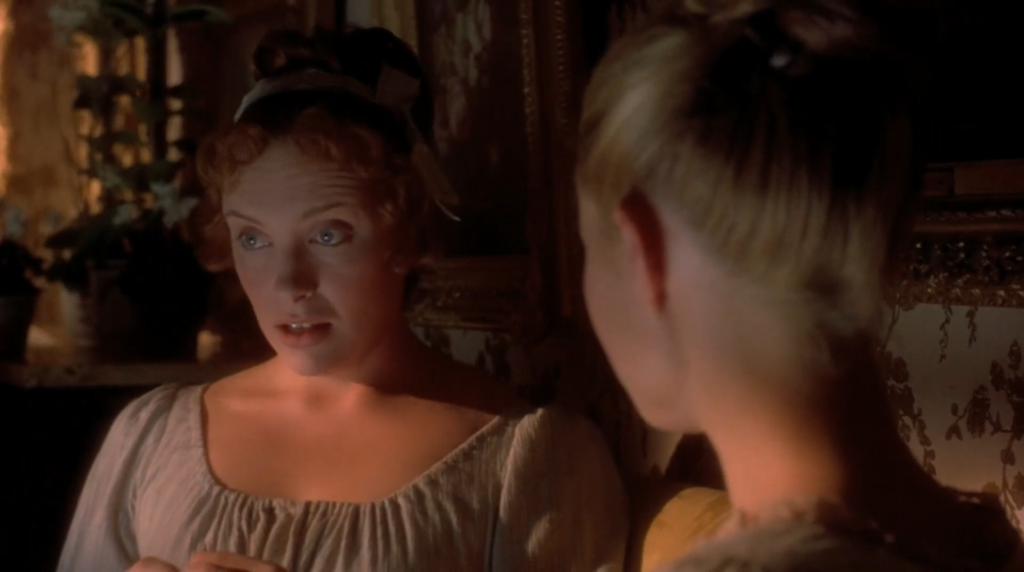
Greta Scacchi is wonderfully maternal and appealing as Mrs. Weston. [4]She also provides opening and closing voiceover narration. The claim that the story takes place “in a time…when the actions at a dance excited greater interest than the movements of … Continue reading Her character is given an expanded role as Emma’s confidante and mother figure. This arguably makes it harder to get a bead on where Emma’s character problems come from. In the book, it’s blamed on nobody criticizing during her childhood other than Mr. Knightley. Here Mrs. Weston is less overindulgent and acts just as much her conscience. Still, I’d be sorry to lose her presence in the movie. She probably makes the movie feel warmer than an adaptation of Jane Austen has a right to be. But, for all her aloofness and cynicism, Austen did include warm, intelligent, positive older characters in her books, like the Gardiners in Pride and Prejudice and the Crofts in Persuasion, even if they weren’t the characters she was most interested in writing. This version of Mrs. Weston would fit in well with them, and arguably the literary one would too, despite her faults.
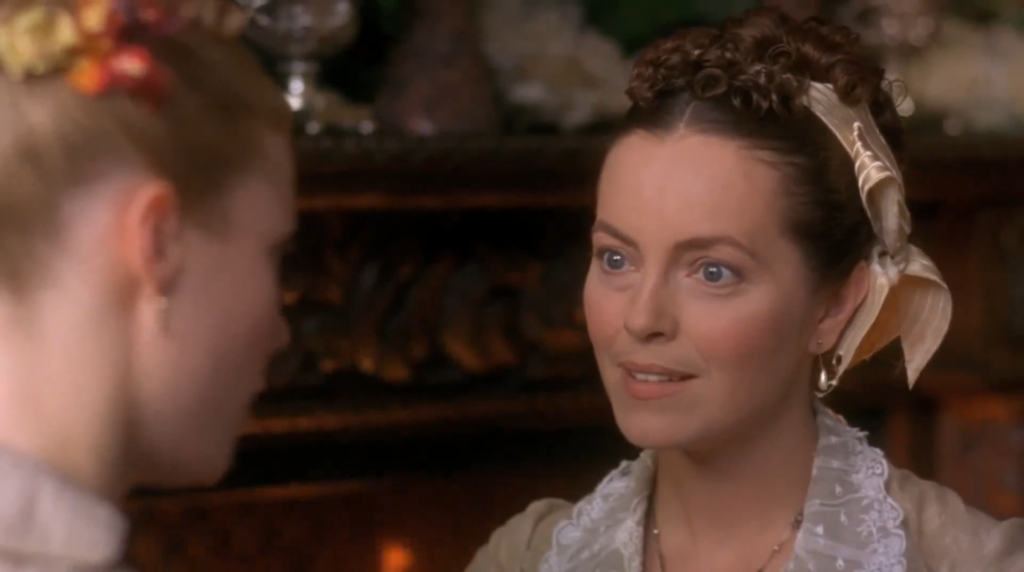
Sophie Thompson is hilarious as the annoyingly chatty Miss Bates for most of her screentime. The one time she isn’t is near the end when Emma casually insults her in front of her friends where her pained reaction makes you wince if it doesn’t break your heart. Some may find this transition a bit out of nowhere and prefer portrayals of the character that lay the groundwork for it earlier. But I feel the very surprise of the moment is the whole point. Watching the scene, we’re prepared to laugh with Emma at Miss Bates and are shocked to be made uncomfortably aware that she’s a person with feelings.
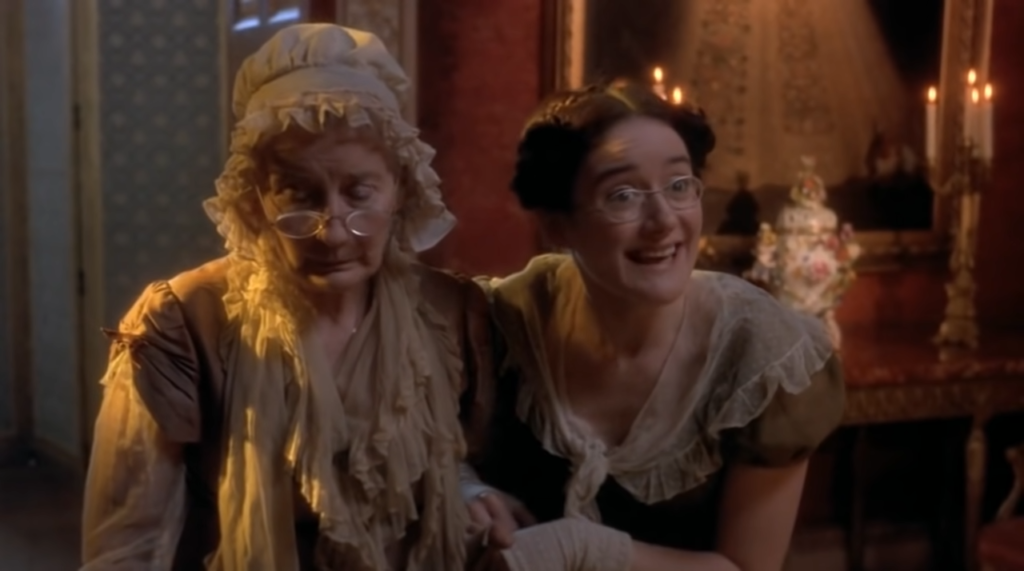
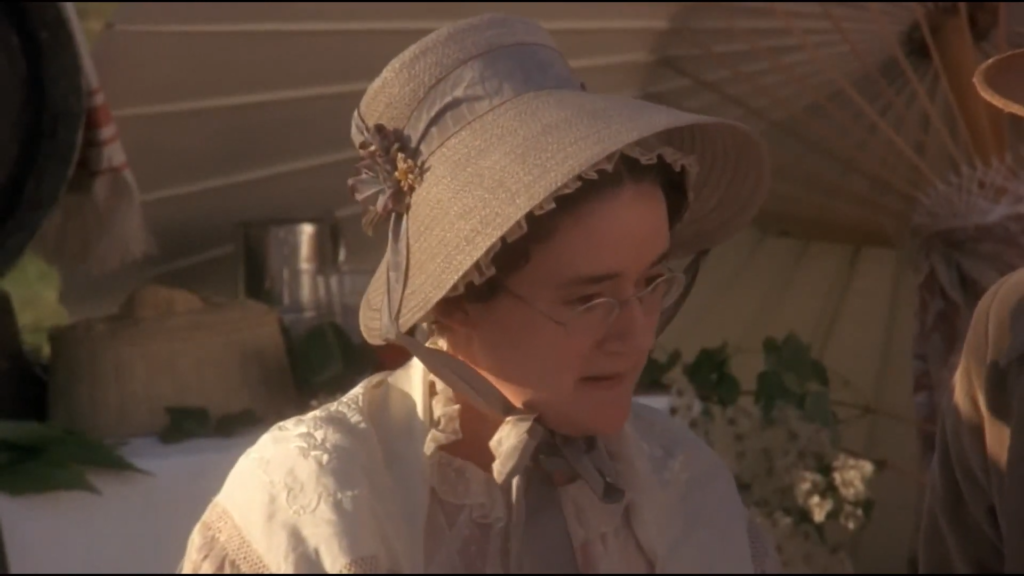
This is easily the funniest of the Austenian movies in my experience. Even the angsty romantic part towards the end where Emma is worried that she’s lost Mr. Knightley to another woman is played for (big) laughs. Some fans of the book may not approve of this, but I think Douglas McGrath deserves great praise for understanding that Jane Austen is supposed to be funny. What’s more she’s supposed to be fun and engaging. It’s amazing how some directors fail to pick up on this obvious fact. Ang Lee’s 1995 film, Sense and Sensibility, is a particularly tragic case in point. It has a very funny and engaging script, courtesy of Emma Thompson, which can happily be read at the Internet Movie Script Database, but the actors, except for those playing the completely comedic characters, deliver the dialogue in such soft, serious tones that not a single punchline lands.[5]It’s particularly frustrating to hear Thompson, normally an actress of great comedic timing, delivering the witty lines she herself wrote, so badly. The whole thing is a tastefully drab, joyless, unengaging viewing experience.[6]The 1995 Persuasion is much the same, though I cut it some slack since it’s supposed to be a sadder, less funny story. McGrath’s comedic timing, by contrast, is perfect.
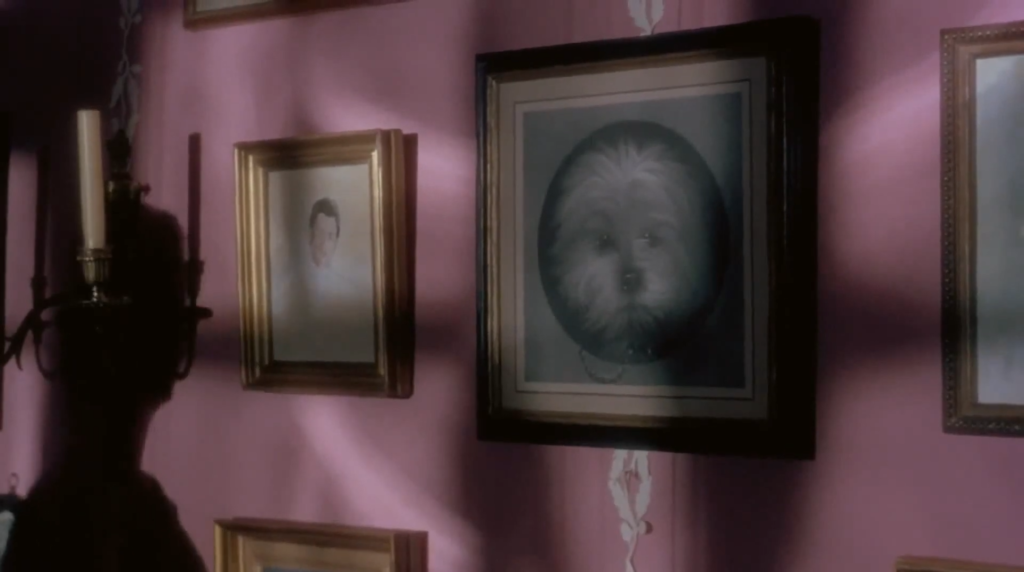
Almost all of the movie’s jokes come in some way from the book-and even those that don’t are great[7]I like to think Austen herself would have enjoyed Miss Bates’s line that a sermon of Mr. Elton’s left her speechless and that she has not stopped talking about it since.-but he effortlessly translates the distinctly literary humor into cinematic humor with devices like ironic cutaways. An early montage showing everyone in the small town of Highbury talking about a letter from the elusive Frank Churchill like it’s most interesting thing in the world does a great job of showing how dull life there can get. McGrath also does a better job of finding activities for the characters to do to keep their many dialogue scenes visually interesting than any other director of an Emma adaptation I’ve seen. And I haven’t even mentioned Rachel Portman’s beautiful soundtrack!
If this adaptation has a major drawback, it’s that it under develops Frank Churchill and Jane Fairfax compared to the book.[8]A minor drawback might be that Mr. Knightley is a little too eloquent for my taste in his big proposal. In the book, he says, “I cannot make speeches…if I loved you less, I might be able … Continue reading In particular, given how much Emma has resented Jane throughout the film, I would have liked to have seen a final scene of them reconciling and shedding light on her enigmatic character. The ending could stand to be clearer in its stance on Frank too. To be fair, Austen’s portrayal of the character was complex and just how far he could be redeemed was an open question. No two-hour movie could do justice to it while still giving the other characters their due. But it’d be nice to know whether the movie was being intentionally ambiguous about him or accidentally so.
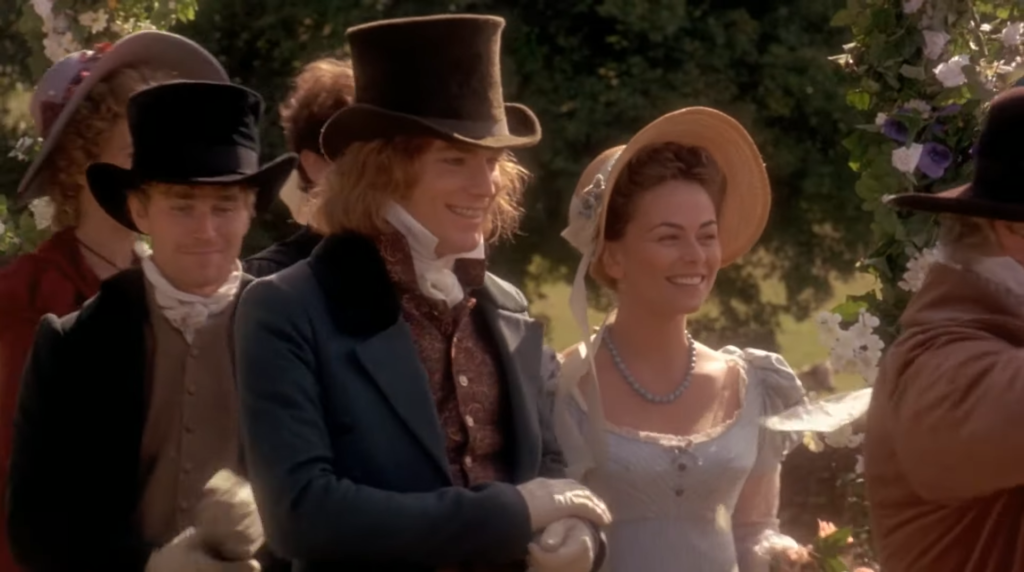
For me though, the adaptation’s strengths more than make up for that. And I’d argue the comedic emphasis doesn’t detract from the story’s drama or moral seriousness. It just allows them to sneak up on the viewers as they do on readers of the book. In one way, I actually believe the movie improves dramatically on the novel. When Emma’s father (Denys Hawthorne) praises her for her charity to the Bateses, she voluntarily confesses that she hasn’t deserved it, even going so far as to say that they have been the ones to be patient with her. (In the equivalent scene in the book, Emma just feels and looks guilty.) This allows her to demonstrate her newfound humility instead of it just being something we’re told she’s acquired, and Mr. Knightley’s response is one of the most heartwarming moments in any Emma adaptation.
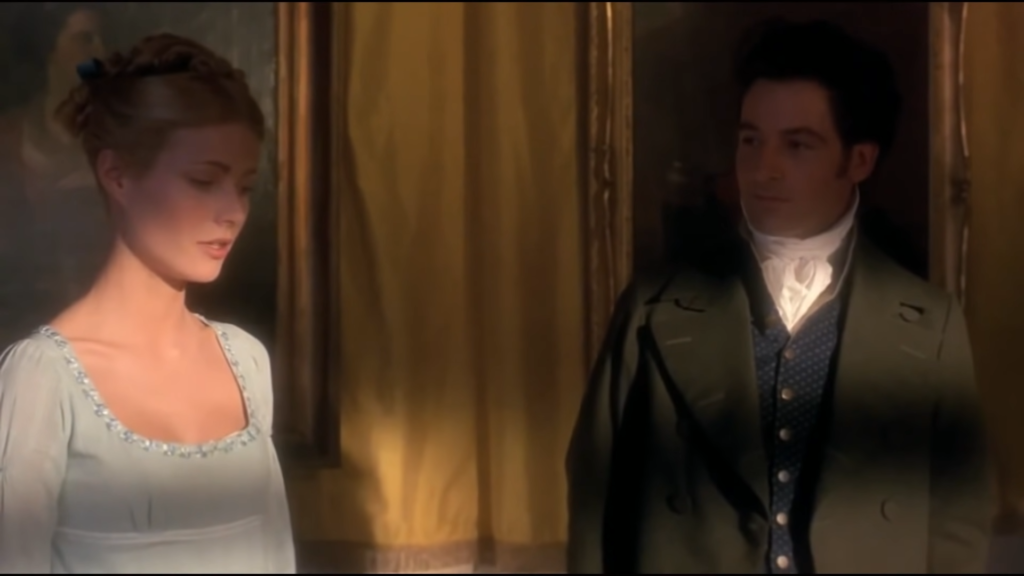
Emma (1996) B

I’ve mentioned this movie before on this blog twice, both times in a negative way, calling it weirdly dark and creepy. I’d like to stress that I don’t have a problem with Emma or Jane Austen’s oeuvre in general being seen as dark. They certainly are in that they take a cynical view of humanity and show just how nasty law-abiding citizens in mainstream society can be. It’s just that I feel that the way director Diarmuid Lawrence and screenwriter Andrew Davies (both of the 2008 Little Dorrit) go about emphasizing that, strikes me as forced and heavy handed. It’s as if they’re embarrassed to be doing a chaste romance about rich people from the eighteenth century and are overeager to assure everyone that they can still be edgy. They even end up making one character dark who definitely shouldn’t be so.
But I’d also like to stress that there’s a lot to like, even love, about this adaptation. The ability Davies displayed in the 1995 Pride and Prejudice miniseries of writing dialogue that blended with Austen’s or making Austen’s dialogue blend with his is still in evidence here. (It was nowhere in his 2007 Northanger Abbey and his 2008 Sense and Sensibility.) He manages to include just about every major moment of the 500-page book in under an hour and forty-six minutes of screentime, and every character whom Austen gave a personality gets amble opportunity to show it off, without feeling crammed. The movie’s first moments, which show thieves robbing a henhouse, struck me as really random on my first viewing, but they turn out to be setting up a minor plot point from the novel’s last chapter, a plot point which is cleverly reimagined here to give Emma (Kate Beckinsale) a chance to use her manipulation skills in a good cause for once
This is also the Emma movie with the best idea of how to get into the main character’s head, a challenge for anyone who adapts the psychologically driven book for a visual medium. The other 1996 Emma sometimes used diary entries, which worked but were hardly creative, and sometimes used Mrs. Weston as Emma’s confidante and conscience, which, as I wrote above, worked but distorted the characters somewhat. The 2020 Emma would mostly rely on the actress’s facial expressions which might have worked if she’d been up for it. (She wasn’t in my opinion.) This Emma uses semifrequent daydream scenes, which establish the protagonist as an “imaginist,” to use the book’s term, who is somewhat bored with her life and craves excitement, more effectively than anything in the other films. These fantasy sequences are often amusing and even become dramatic towards the end.
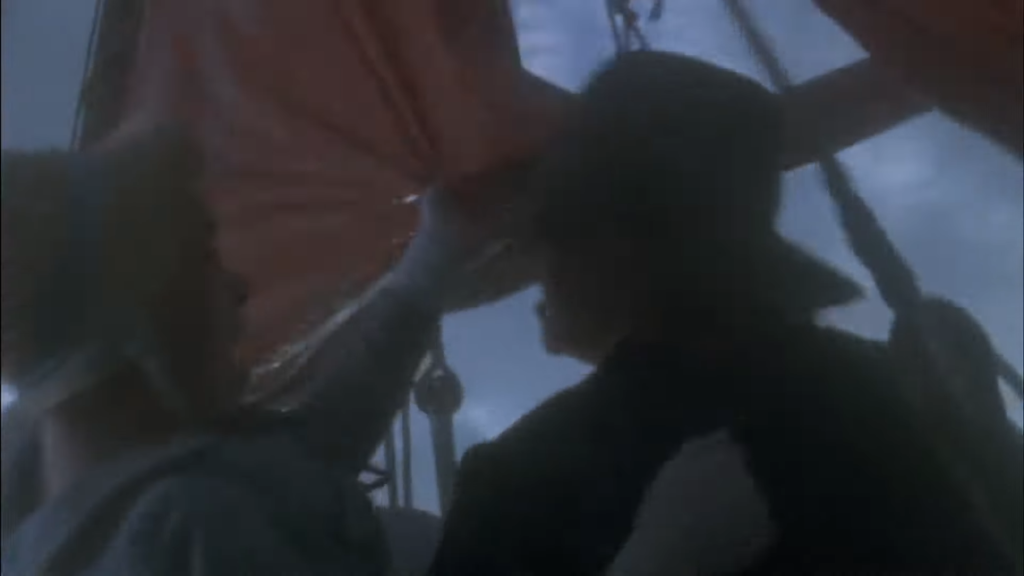
I want to like Kate Beckinsale as Emma. It’s nice to see a brunette in the role and at times, she displays a mischievous smile and at other times, a languid haughty tone of voice, which serve the character well.
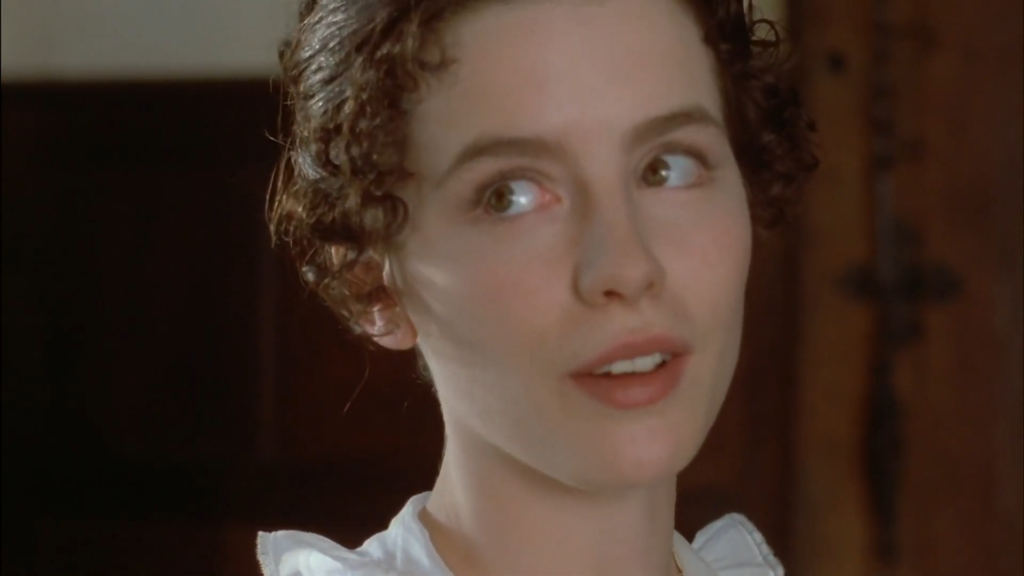
But she also tends to frown a lot as if the sun were in her eyes all the time. Part of the problem may be the script which makes Emma more unlikeable than she has to be. Not that it cuts her good qualities, such as her patience when dealing with her demanding, hypochondriacal father (Bernard Hepton.) But whenever she does something bad, as, to be sure, she often does, the movie tends to overemphasize it. The scene of her politely blackmailing Harriet Smith (Samantha Morton) into refusing Robert Martin (Alistair Petrie) plays out like a mafia member threatening to off someone.
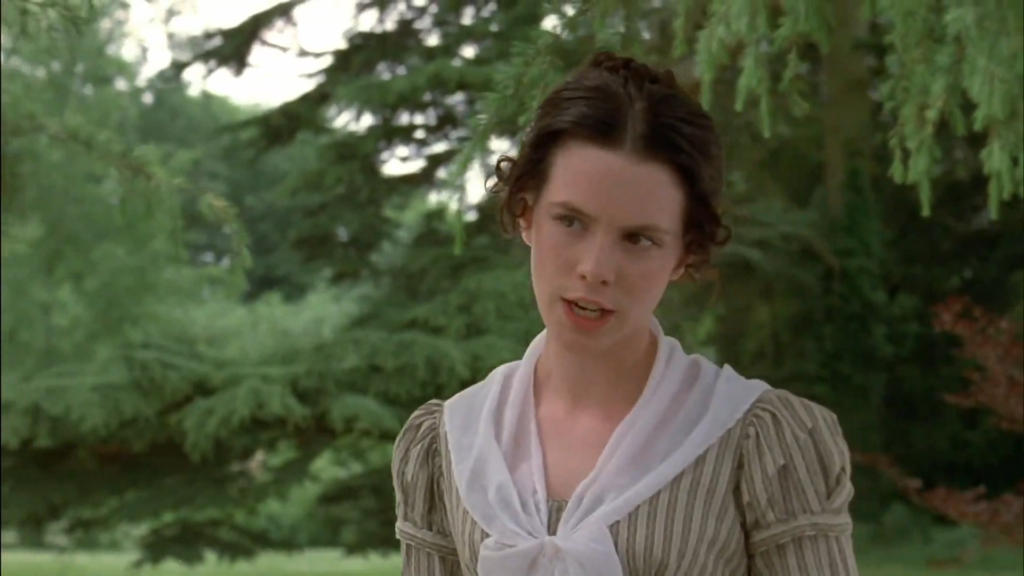
When asked about Jane Fairfax (Olivia Williams) by Harriet, she says, “Jane Fairfax is a penniless orphan who has been brought up in some style by Col. Campbell as a companion to his daughter.” To the script’s credit, this does a better job of establishing Jane’s situation in life than anything in the other two movies. But was it necessary to make Emma sound as snobby as possible here? It’s instructive to look at the equivalent scene in 1996 A where she says with tight lips, “there’s not much to be said for her. When pressed, I say she is elegant.” Not only does this imply Emma’s resentment of Jane Fairfax while still having her be relatable, it’s much funnier.[9]There’s a great subtle callback to this in a later scene. When Emma invites Mr. Knightley to praise her (Emma’s) piano playing, he slyly says it’s “very elegant.”
Here’s what Emma says in the book when Harriet asks how she can stand the prospect of being an old maid like Miss Bates (Prunella Scales in this movie.)
“That is as formidable an image as you could present, Harriet; and if I thought I should ever be like Miss Bates! so silly—so satisfied—so smiling—so prosing—so undistinguishing and unfastidious—and so apt to tell everything relative to everybody about me, I would marry to-morrow. But between us, I am convinced there never can be any likeness, except in being unmarried.”
1996 B just has her say, “if I thought I should be like Miss Bates, I would marry tomorrow.” I certainly wouldn’t expect or desire her whole speech to be kept. But why, when trimming it, did this movie have to take out everything witty and engaging about it, leaving only the meanest sounding part?
What this adaptation does to Mr. Knightley (Mark Strong), the hero, is inexcusable. Watching him, you’re more likely to root for Emma to get him a restraining order than for her to end up with him. To make his character more dramatic, I can only assume, they emphasize his jealousy of Frank Churchill (Raymond Coulthard) to the point of ridiculousness. When he hears that he’s gone to town solely to get his hair cut, he reacts as if Frank has gambled away the family fortune.
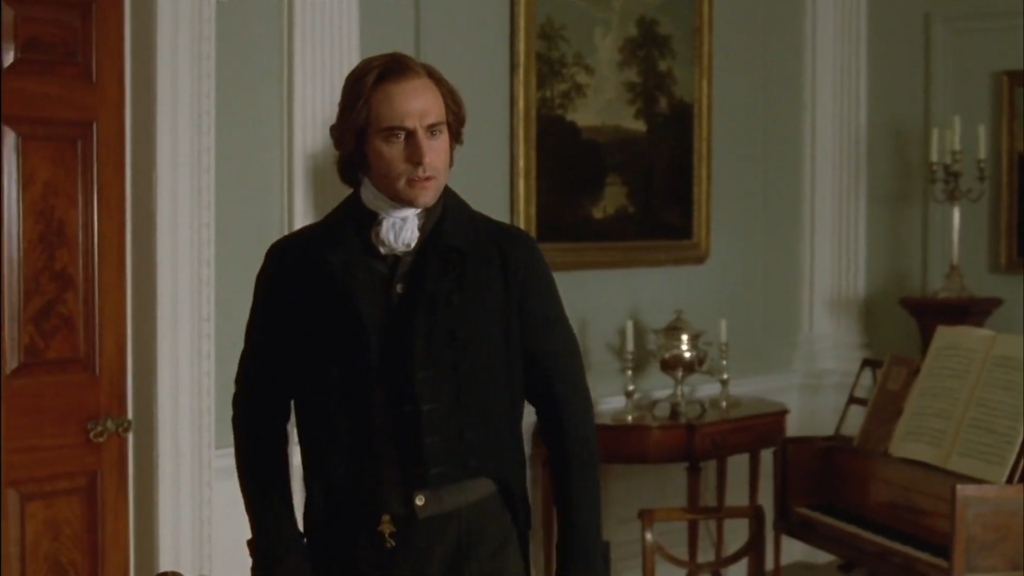
When he’s admiring Jane Fairfax’s piano skills, he also stares at her, weirdly entranced. Presumably, this is to make her a bigger romantic red herring for him, but since he ultimately isn’t in love with her, its awkward and inexplicable. Could he be feigning attraction to make Emma jealous? That wouldn’t be in character for the literary Mr. Knightley.
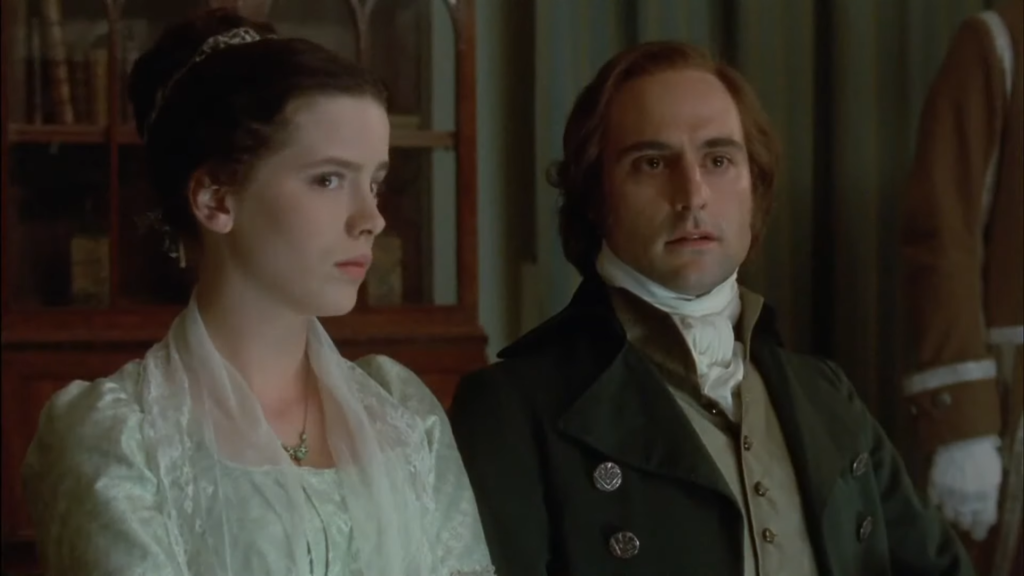
In the book and other adaptations, the fact that Knightley is decades older than Emma is established once and never mentioned again. This adaptation seems to find it hot somehow.[10]What might be happening is the creators not wanting anyone to accuse them of sanitizing this potentially controversial element and going to far in the opposite direction. Mr. Knightley is compelled to make up with Emma after their quarrel about Harriet when he sees her holding her niece, and says, “I held you thus once.” Later, after she agrees to marry him, he exclaims rapturously, “I held you when you were three weeks old(!)” “Have I improved since then?” Emma asks playfully.
Errr…..
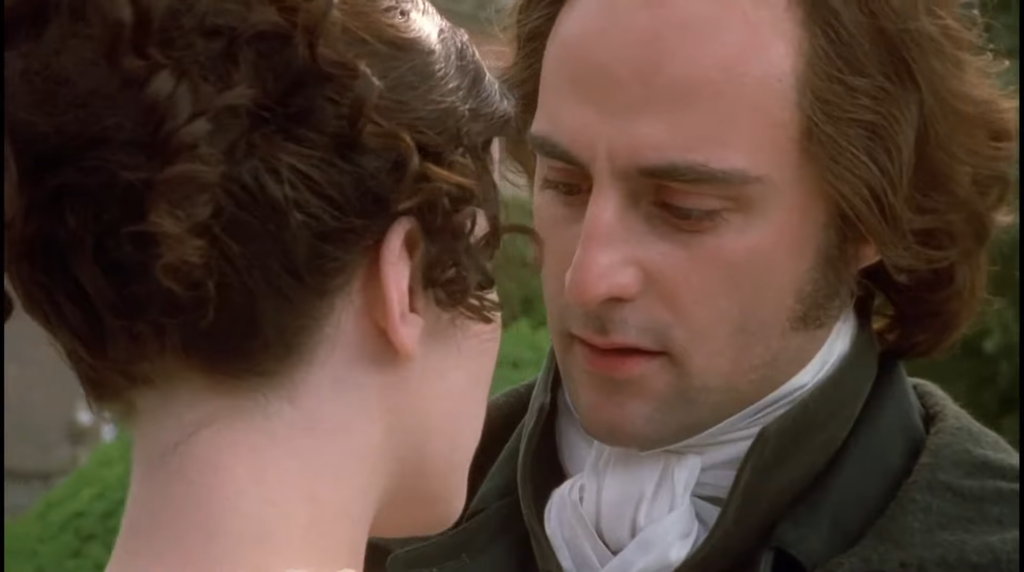
I don’t mind the darker take on Frank Churchill. His sadism here is a bit of an exaggeration of the book’s character, but not a huge one.[11]Emma in this version finds his motive for concealing his engagement, that his aunt would disinherit him if she found out about it, to be selfish. But wouldn’t such a thing be just as bad for … Continue reading And Raymond Coulthard has more of a presence than any of the other actors who take on the role in the other cinematic Emmas.[12]I wouldn’t necessarily say he’s a better actor on the whole than they are. Just that he makes a bigger impression as this particular character. Actually, he has almost too much of a presence in the role. His face is so obviously smug and knowing that you spend all his screen time waiting for the other shoe to drop and his villainy to be revealed. Likewise, Olivia Williams is more compelling to watch than other cinematic Jane Fairfaxes, but her concealed sadness and anger are arguably too palpable. Instead of finding her cold and unappealing, it feels like this Emma should be more intrigued by her and work harder to probe her mystery. A problem with every version of Emma, including the book, in my opinion, is that it’s too obvious that there’s something going on between Jane Fairfax and Frank Churchill. Boy, is that really a problem here!
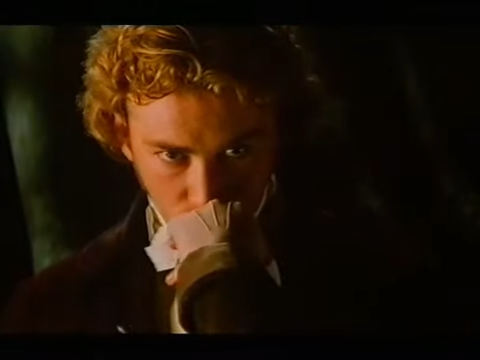
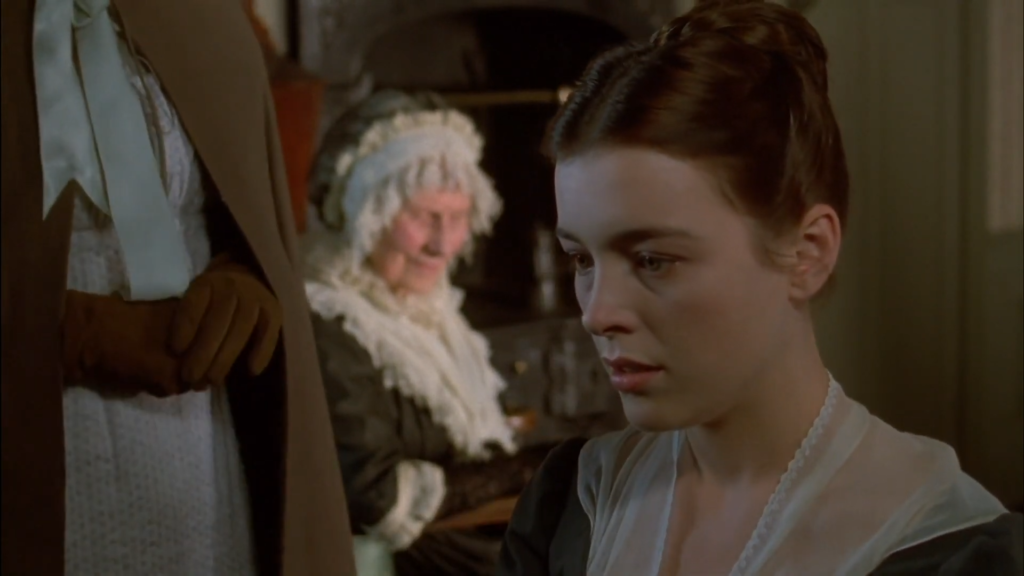
To its credit though, this Emma movie does the best job of the three of portraying Emma’s sister, Isabella (Dido Miles), and her husband, John (Guy Henry.) Small praise since they’re hardly the most important characters, but still somewhat refreshing. In 1996 A, neither of them had any personality. In the 2020 Emma, Isabella would be appropriately silly and John appropriately cranky, but they would come across as much more dysfunctional than in the book. This film manages to convey their nuanced characters very well with only a little bit of screentime.
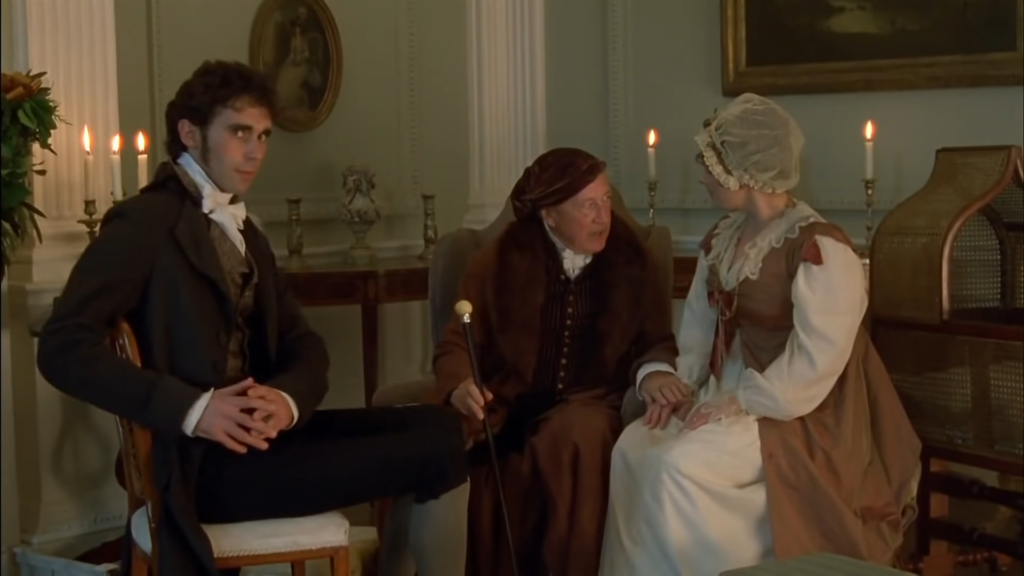
A notable aspect of this adaptation is its emphasis on the servants and other lowerclass people living in Highbury. On a first viewing, this struck me as a tired attempt to be “woke”[13]Not that people would have used that term in the 90s. since no such people play anything like a major role. Even the Martins, while important to the plot, are effectively noncharacters. But on reflection, this is true to the spirit of the book. While Jane Austen didn’t focus on anyone below her own class as a character in Emma, anymore than in her other books, she did keep them in the back of readers’ minds to an unusual extent for her. The characters mention their servants regularly and a surprising number of them have names, if not personalities. (The Woodhouses’ coachman, James. Mr. Knightley’s man, William Larkins. The Bateses’ maid, Patty.) She seems to have wanted to emphasize in Emma all the different classes and how they all depend on each other.
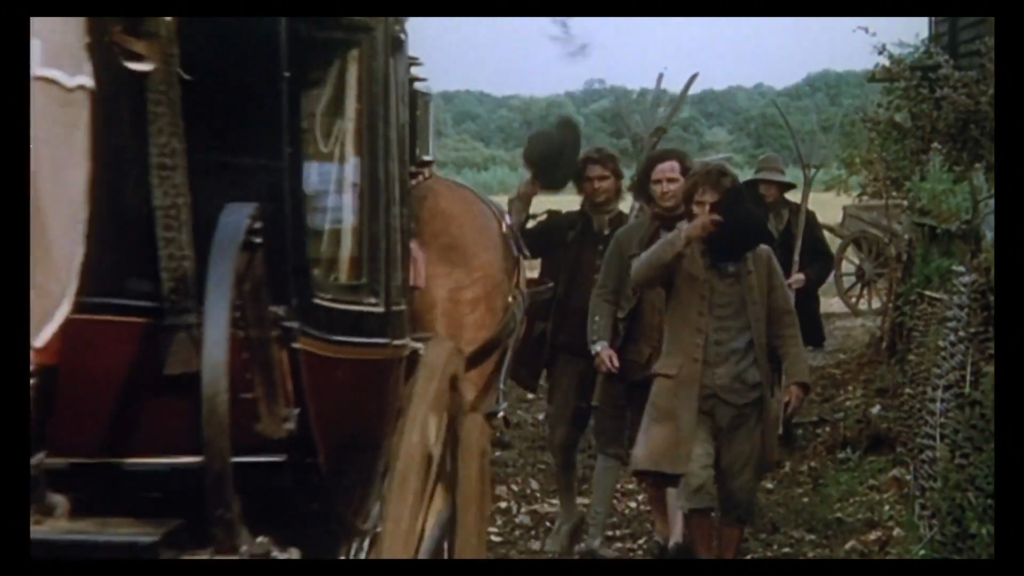
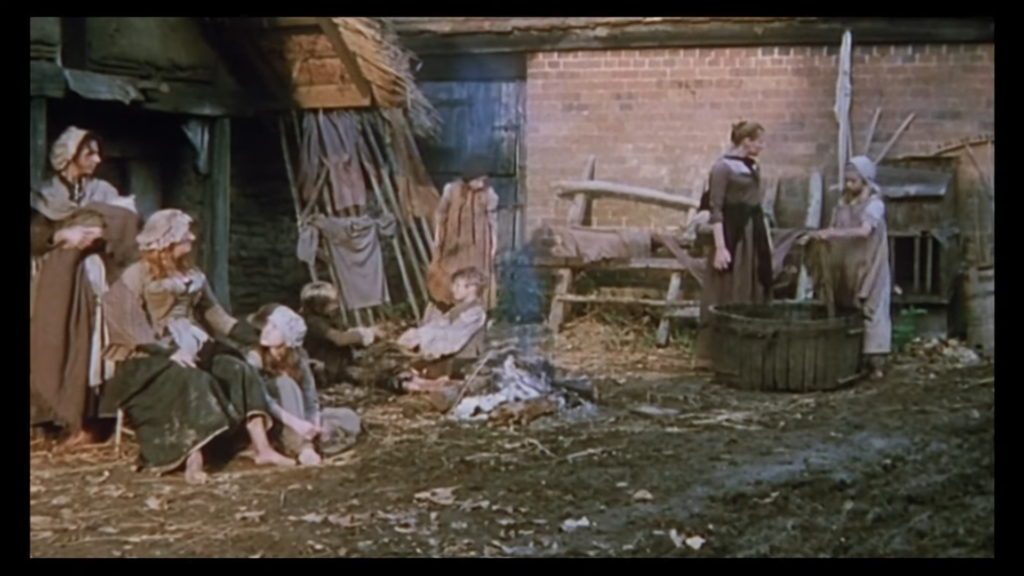
Emma (2020)
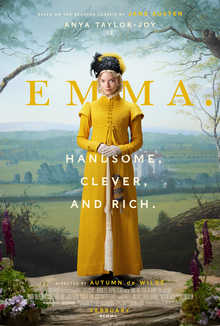
There’s a good argument to be made that this most recent adaptation from Focus Features has the best script of any Emma movie at least as far as restructuring the plot goes. While not as good at writing inconsequential babble for Miss Bates (Miranda Hart) than McGrath or Davies,[14]Or perhaps Hart was just less skilled at improvising than other Miss Bateses. Eleanor Catton does a better job at balancing all the different subplots. In 1996 A, Harriet Smith’s story hogged the movie somewhat and in 1996 B, Frank Churchill’s did. Not so here. Of course, the flipside of that is that there were memorable Harriet moments included in 1996 A and memorable Frank moments in 1996 B that aren’t in this version. Still, the sense of balance is nice. I admire how Frank Churchill (Callym Turner)’s mysterious absence is established as early as possible and the way the ball at the Crown Inn, the rescue of Harriet (Mia Goth), and her subsequent confession to Emma (Anya Taylor-Joy) that she has a new crush become one long continuous action. And there are some inspired ideas like the running gag of Mr. Woodhouse (Bill Nighy)’s obsessive fear of drafts, the overelaborate, tacky frame Mr. Elton (Josh O’ Connor) gets for Emma’s painting and the introduction to the character of Mrs. Elton (Tanya Reynolds.)[15]If you don’t mind it being spoiled, when Emma first sees her at Church, she’s sitting in the Woodhouse pew. The audacity!
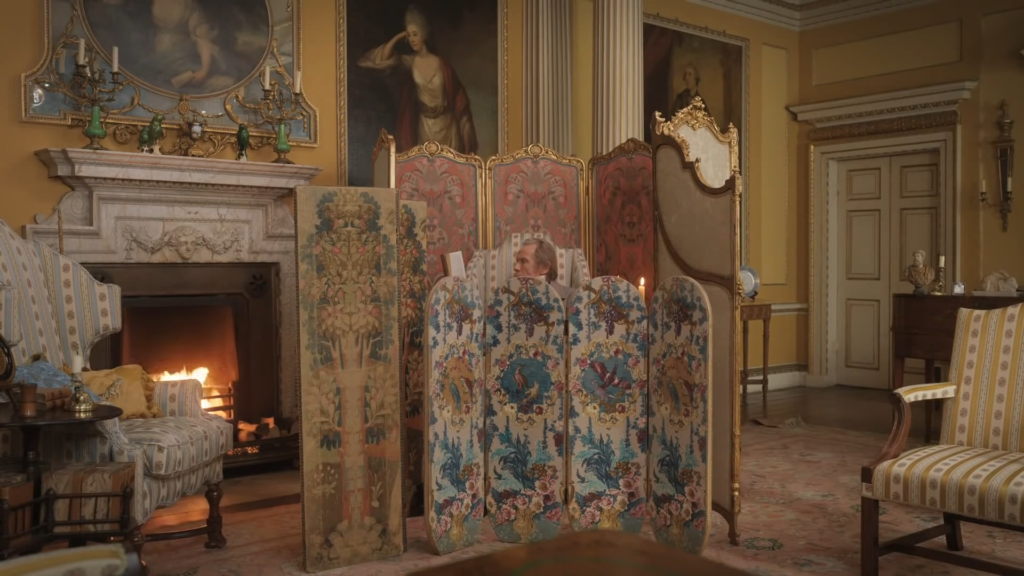
But if I were to say that this script did the best job at adapting the book, I would have to be talking about the screenplay as published online for award consideration, not the actual movie as directed by Autumn De Wilde. While as written, it’s rather wordy and long and some cuts had to have been made, the ones that were make it less effective as a piece of storytelling and play into the writing’s weakness or potential weaknesses. For example, bits establishing the character of Mrs. Goddard (Anna Francolini) and her school are either cut or moved until after she’s been referred to several times before we have any idea of who she is. While Emma still boasts of her matchmaking prowess early on, she no longer mentions her desire to find a match for Mr. Elton specifically, which makes her quest to set him up with Harriet rather abrupt. Almost all of Frank Churchill’s early dialogue with Emma has been cut. At one point, Mr. Weston (Rupert Graves) excitedly tells Emma that Frank is returning when we’ve never seen him leave. And on less plot important level, a hilarious final line from Mrs. Elton did not make the final cut, though to give credits where it’s due, a lot of great lines for John Knightley (Oliver Chris) were (apparently) improvised onset.
There are also things that weren’t cut but really feel like they should have been. Mainly, a gratuitous scene of Mr. Knightley (Johnny Flynn)’s bare backside as he’s changing, and a less, shall we say, generous but equally pointless bit of Emma, in the privacy of her room, lifting up all her skirts to warm her bare butt by the fire. Both of these were obviously included just to Avoid the Dreaded G-Rating and come across as eyeroll inducingly tacky. [16]1996 A avoided it by including some swearing in the scene where Harriet is harassed by gypsies. While the profanity was somewhat awkwardly phrased, this worked a lot better. They arguably are part of this Emma‘s odd earthiness. Emma’s baby niece spits up on her and, in the middle of a big romantic scene, she[17]Emma, not the baby, gets a nosebleed.[18]The published screenplay also had Harriet get a bad case of the hiccups at one point. I wish that had been kept; it was funny. While Jane Austen seldom, if ever, wrote about such bodily functions, this aspect of the movie does show an anti-Romantic realism, which is true to her vision.
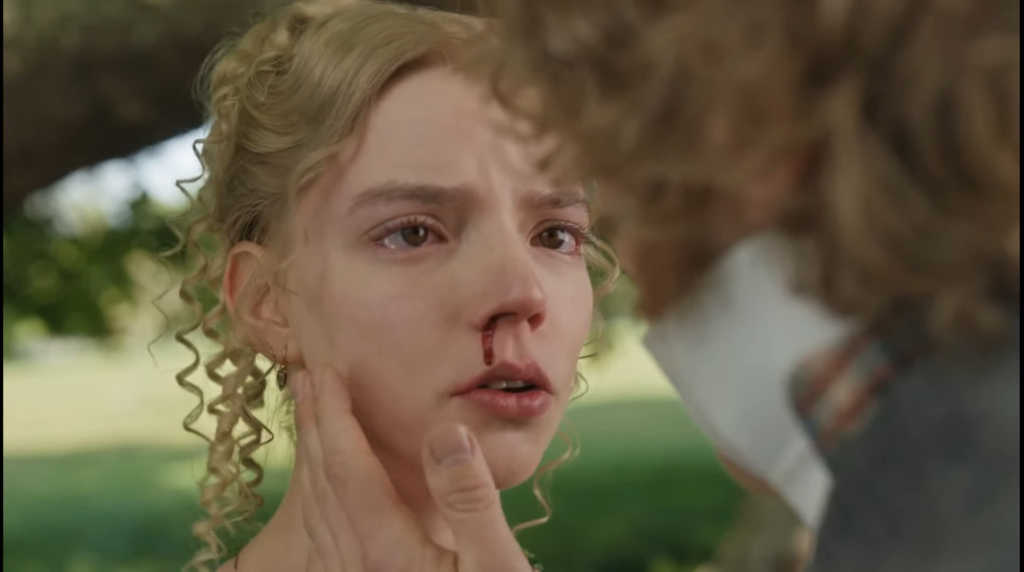
Less anti-romantic is how this adaptation has Knightley and Emma silently realize their feelings for each other sooner than the book does and almost tell each other in a scene that might have worked on its own terms, however untrue it was to the spirit of Austen, but falls flat because of how little chemistry the actors have.
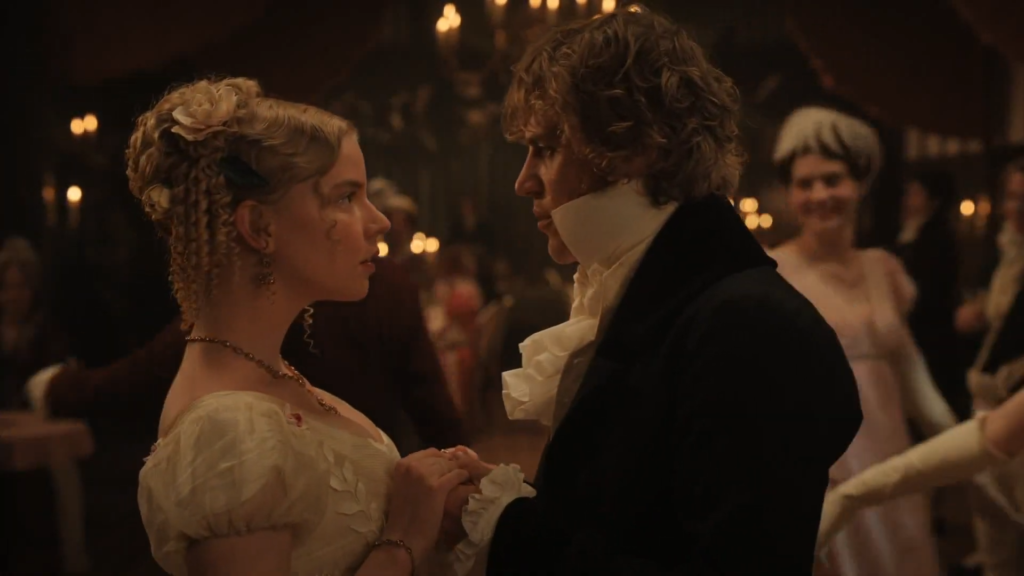
This brings me to the subject of the cast, which I come to with some reluctance because I risk sounding mean. However charismatic they might be in other parts or in real life, there’s a weird lack of charm to them here. The comedic characters are offputtingly cartoony and caricatured. I can’t believe I’m saying that about a Jane Austen adaptation, especially since I complained about directors not making them funny enough! Whatever its faults, this film is funny, if not as funny as it could have been, mostly due to the ridiculous art direction and hairstyles and the actors’ humorous body language. But, despite our ardent disagreement about Emma adaptations, I agree with Richard Jenkyns that the line between caricature and realistic character study in Austen is not as clearly drawn as you’d think. Some of her adapters have leaned too heavily into romance and emotion but leaning too far into grotesquerie is a possible misstep too. And the extent that Harriet is played as a caricature here, with her little lisp and her puppy dog eyes, doesn’t mesh with the way this adaptation makes her less oblivious toward the end and gives her more emotional range than any other version.
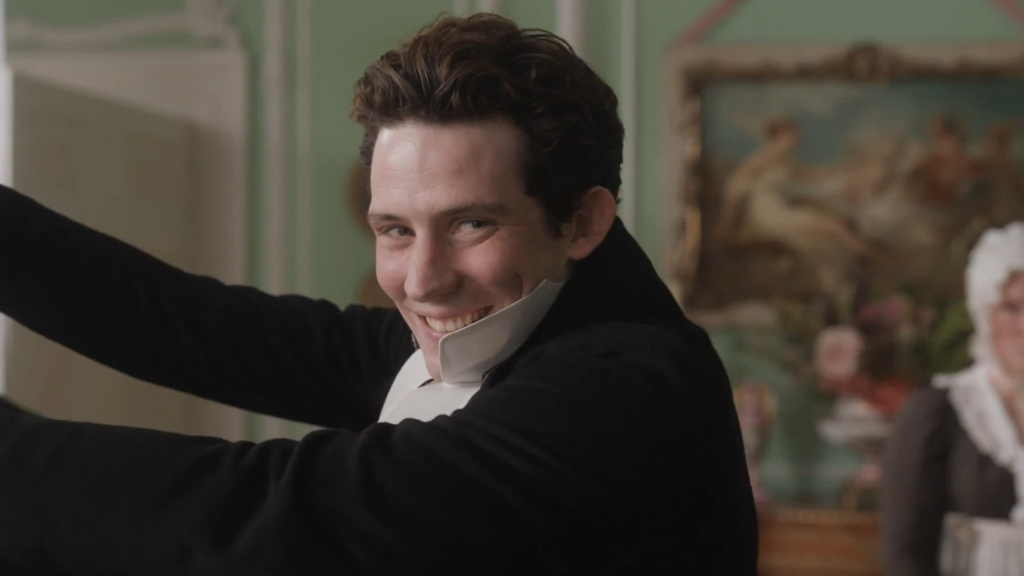
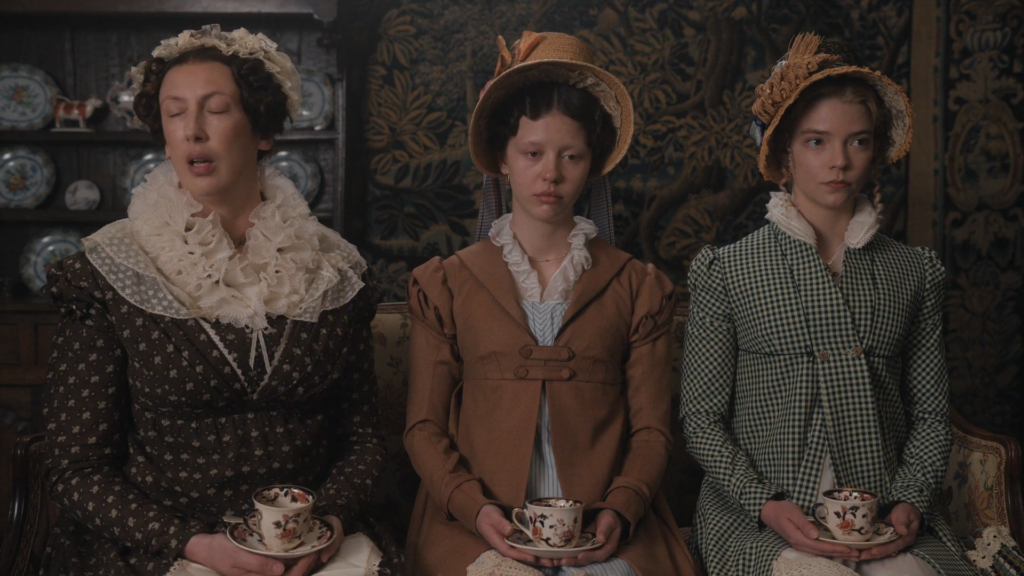
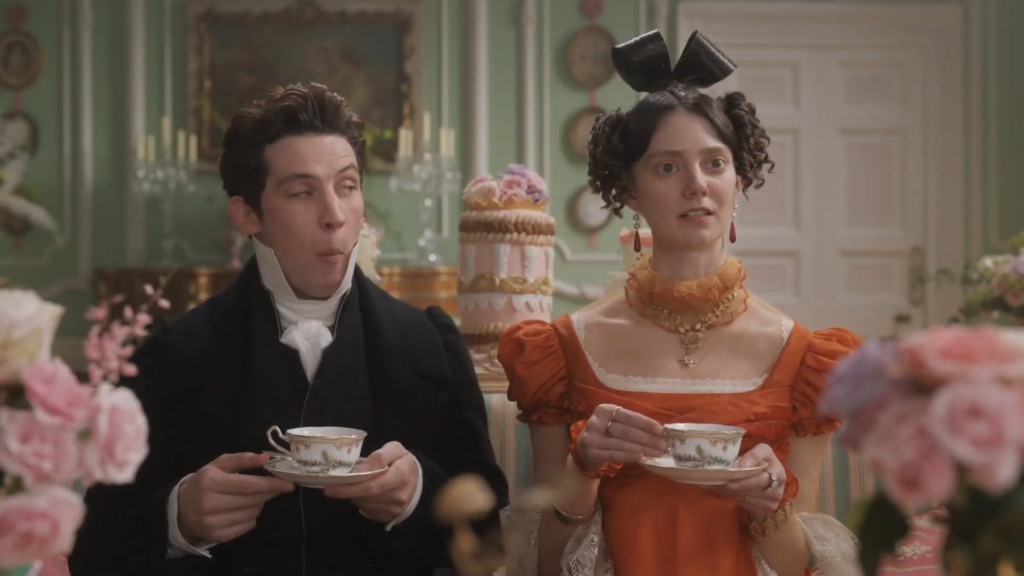
The serious characters, on the other hand, mostly just come across as stiff and boring. It’s especially problematic how dull Callym Turner’s Frank is when he’s supposed to be this dashing, charismatic heartthrob.
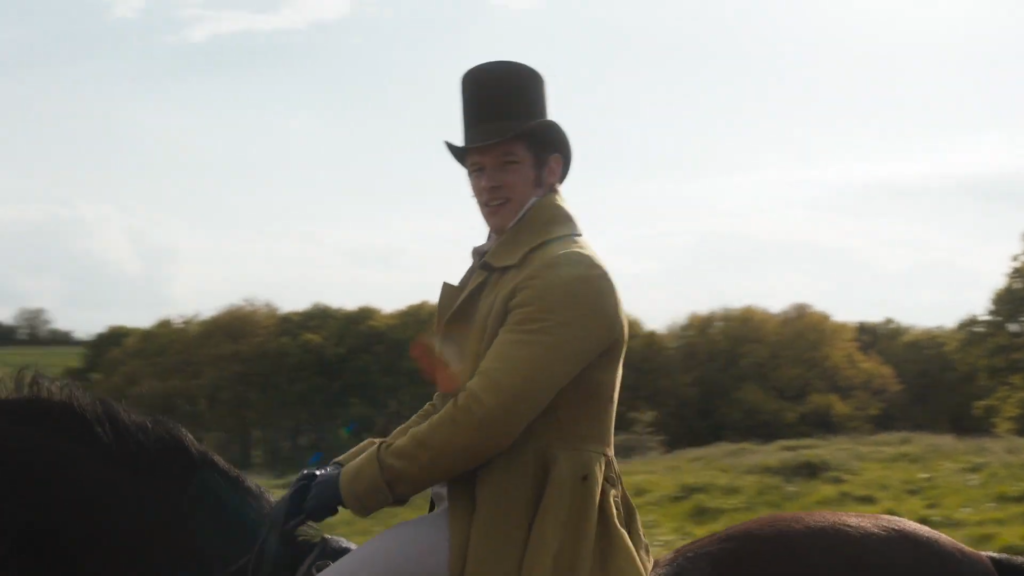
Amber Anderson’s Jane Fairfax mostly looks grumpy. The benefit of this is that it’s unusually easy to understand why Emma finds her manners so cold and uninviting. The downside is it’s also unusually hard to understand why everyone else finds her so charming.
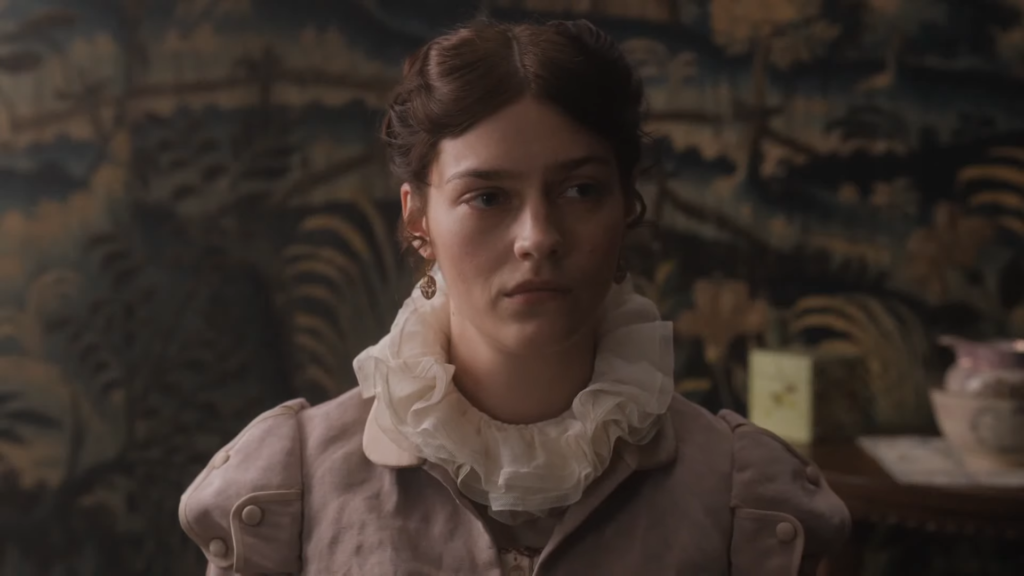
The most memorable thing Johnny Flynn brings to the movie is not his performance as Knightley, but the end credits song, My Queen Bee.[19]Seriously. Look it up on Youtube.
I can’t believe I’m saying this but I think Anya Taylor-Joy’s Emma is too haughty. It’s vital, of course, that Emma be arrogant and full of herself, but she’s also supposed to be playful and lively. Taylor-Joy looks disdainful and haughty in almost every scene. This is great when she’s dealing with, say, Miss Bates or Mr. Elton. But it’s nigh impossible to understand why she would befriend Harriet at all, especially since this adaptation portrays Harriet as shyer than normal and includes a higher than average number of scenes of Emma being annoyed with her. (I don’t mind the idea of Emma being annoyed with Harriet sometimes, mind you. It’s arguably true to the book. The movie just needed more friendliness to balance it out.) I don’t want to say she made me miss Alicia Silverstone, but she kind of did.
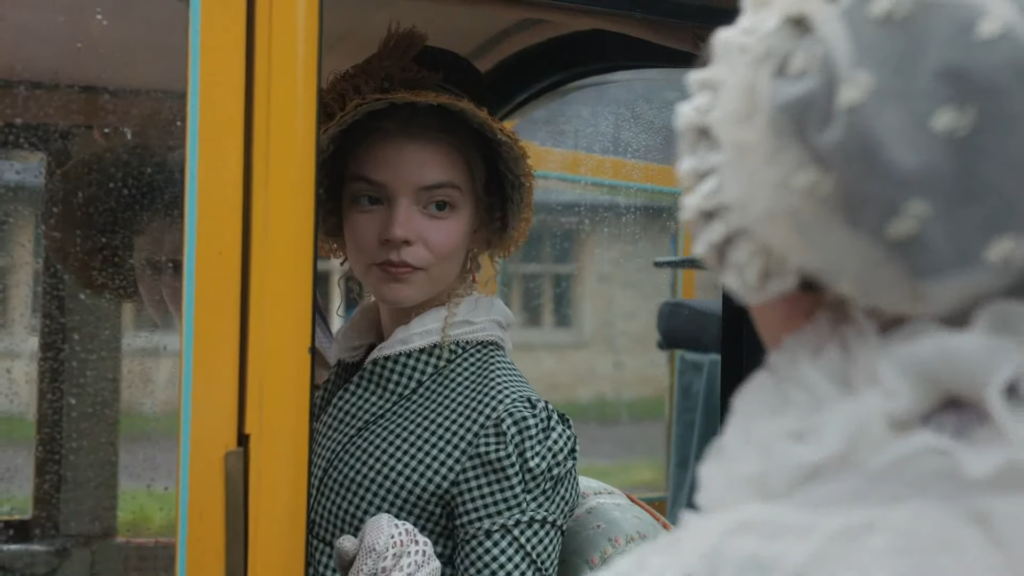
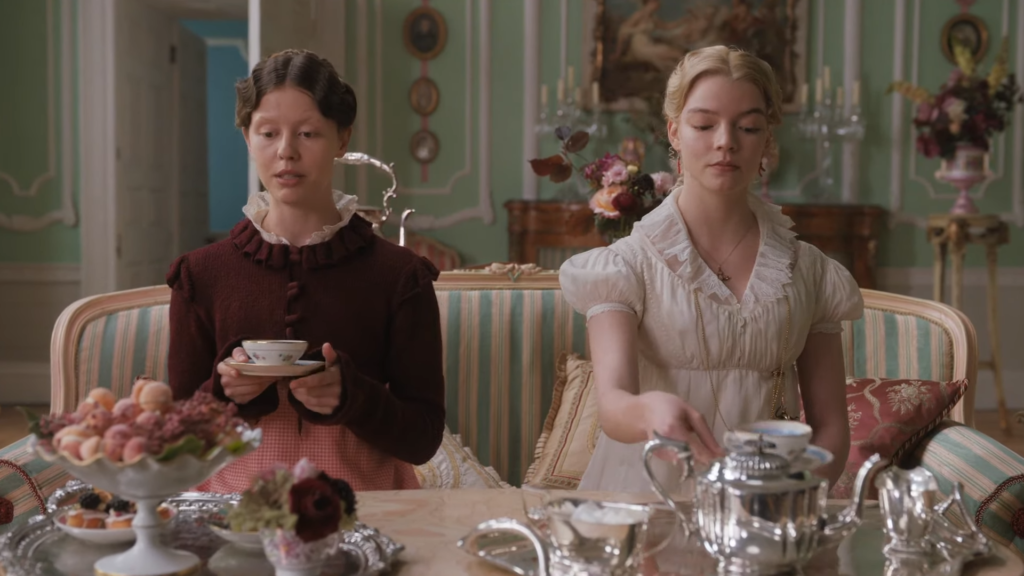
That being said, in the last act, Taylor-Joy pulls her act together and portrays Emma’s newfound humility more powerfully than Kate Beckinsale and possibly Gwyneth Paltrow did. In particular, the scene of Emma making amends to Miss Bates contains some beautiful acting from both of them. Maybe the purpose of the ultra-haughty Emma was to make her humbling as dramatic as possible. I don’t feel that the gamble paid off though.
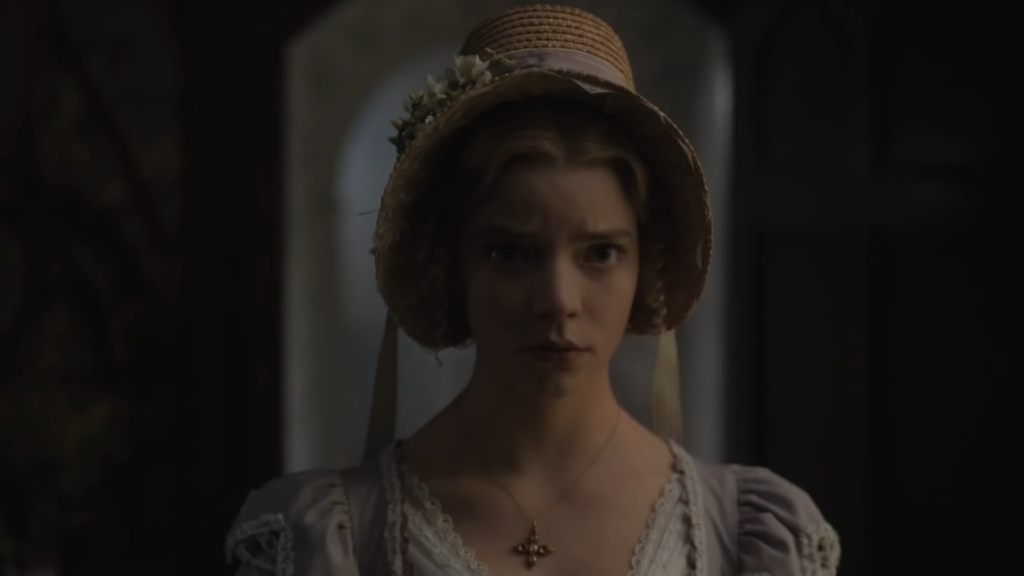
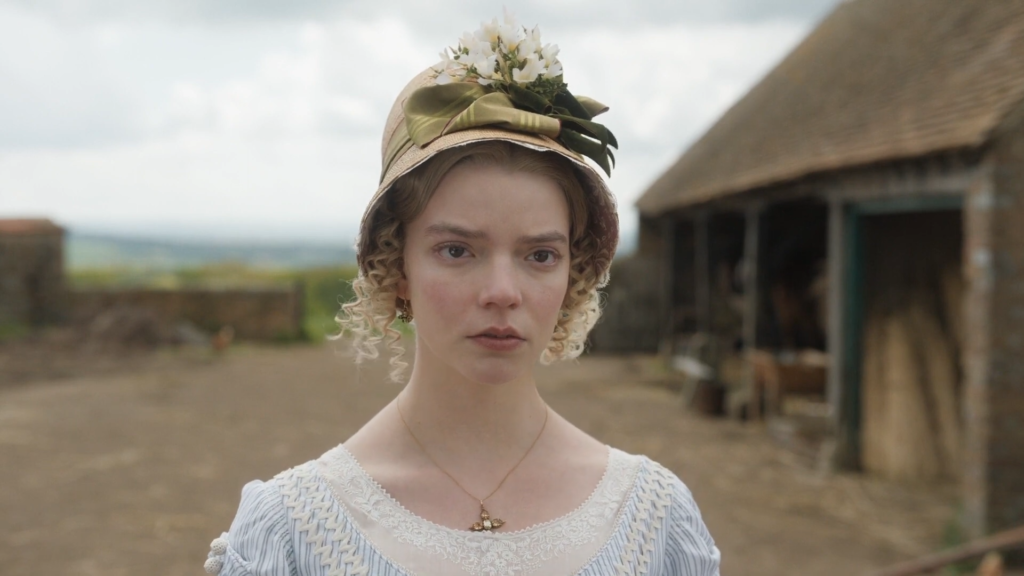
A big problem with how inexpressive the leads are in this movie is how much the script relies on quiet moments contemplating their faces. One of the first scenes shows Emma at Mrs. Weston (Gemma Whelan)’s wedding breakfast with no friend of her own age and social class. This is supposed to establish her loneliness and elucidate why she reaches out to Harriet. But Anya Taylor-Joy’s expression conveys nothing of this. In fairness, a good part of the blame falls to the direction. Few, if any, of the other guests are shown talking to each other, so it’s not like Emma stands out, and the music does little to suggest loneliness.
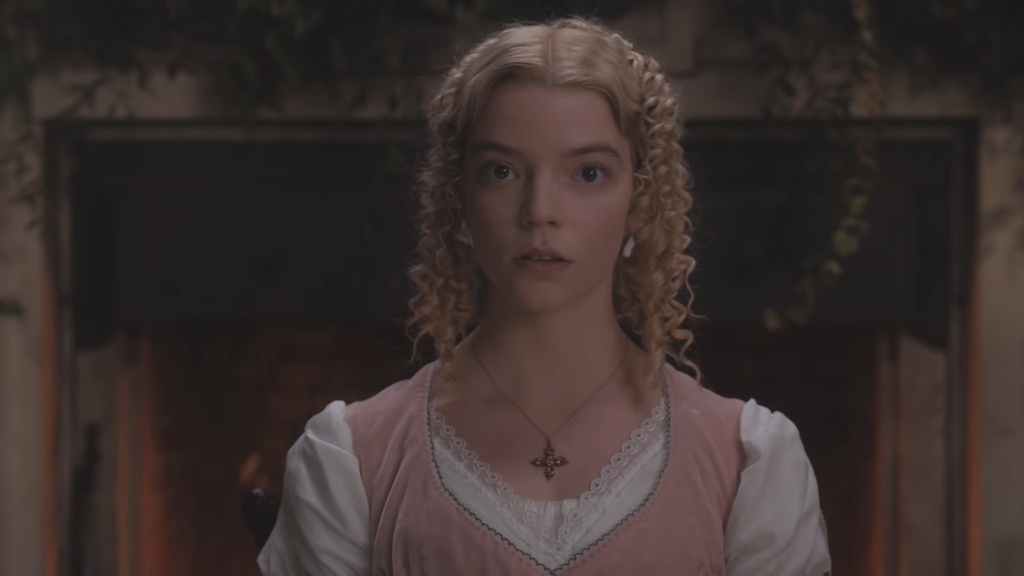
Thus far I haven’t mentioned the element of Emma that is the elephant in the room of any adaptation.[20]Hmm. There’s a tongue twister in there somewhere. Part of the book’s moral, that close relationships between the upper and lower class are unhealthy, is considered as immoral nowadays. Each of the cinematic adaptations is true to this in that Mr. Knightley objects to Harriet’s rejecting Robert Martin on the grounds that he was already above her and she should quit while she’s ahead. He doesn’t claim, as he might have, that social status shouldn’t matter. From that point on though, each film averts or even subverts this aspect of the original. 1996 A keeps Emma being horrified at the prospect of Mr. Knightley marrying Harriet, not only because she loves him herself, but because of the social gap between them, but it has her express this in the most ridiculous way possible (“We know nothing about her parents! They could be pirates!”), making it clear we’re supposed to laugh at her inconsistency (she’d previously insisted that Harriet must be a gentleman’s daughter), rather than feel that she’s finally seen the light. And there’s no indication, as there was in the book, that she and Harriet will grow apart after the latter’s marriage to Robert Martin, though it doesn’t explicitly deny this either. 1996 B goes a step farther. There Emma never expresses a problem with the potential romance between Harriet and Knightley crossing class boundaries at all. Her dismay is only for herself. And she ends up inviting Harriet and her new yeoman husband to visit her. (The Martins are described as visiting her at the end of the book too, but I always assumed that was because they were Mr. Knightely’s tenants.) The movie pointedly ends with a harvest festival to which Mr. Knightley invites both his tenants and the local gentry and only Mrs. Elton objects. Suffice to say Emma (2020) goes even farther than that. The reimagined climax flies in the face of the original book more than anything in previous Emma movies. While I don’t like Austen’s classism[21]In her defense, I think there are practical reasons to be against class crossing relationships as well as snobby ones. Jane Austen valued rationality second only to morality, though she likely had … Continue reading, I find it more interesting when adaptations try to make such dated aspects understandable to modern audiences rather than taking the easy path of completely rewriting them. But I do find this film’s revisionist version of Emma and Harriet’s last conversation really heartwarming. Or I would if this movie did a better job of getting me invested in the characters initially.
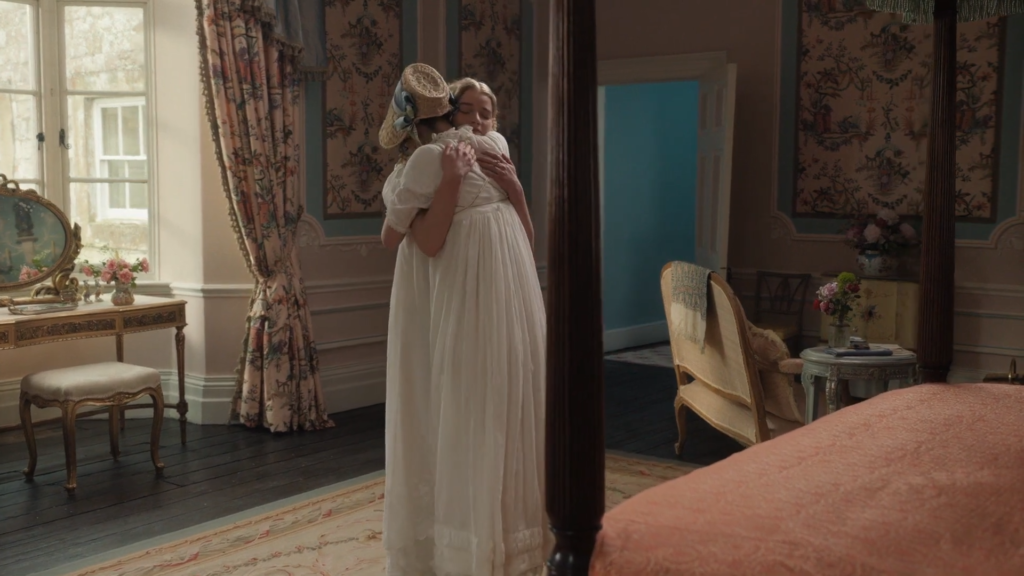
Conclusion
I don’t think I really need to say which of these I think is the best. While the dark and edgy 1996 B and the colorful and cartoony 2020 one both have their virtues, they’re mainly going to be enjoyed by viewers who are already fans of the material, or at least fans of Jane Austen and Jane Austen-type stories. 1996 A strikes me as the only one capable of making new converts. It’s the only one to replicate the book’s trick of making Emma “faultless in spite of all her faults.”
Bibliography
The Project Gutenberg eBook of Emma, by Jane Austen
https://imsdb.com/scripts/Sense-and-Sensibility.html
Emma_Script.indd (focusfeaturesguilds2020.com)
References
| ↑1 | I’m not sure why Mr. Darcy of Pride and Prejudice fame doesn’t get as much as flack as Emma. Both characters are good looking and filthy stinking rich, take good care of their family members, are good friends but in a controlling way, care about the welfare of those under them but think meanly of anyone outside their own set, and ultimately fall for one of the few persons in their lives who criticize them. What a character recommends for Emma, that she be “in love and in some doubt of a return” is, of course, exactly what happens to Darcy and proud and prejudiced would be a good description of her. |
|---|---|
| ↑2 | I suspect both of those changes were made more for the purposes of tightening the pacing than sanitizing the character. |
| ↑3 | Does all this comedy undermine the story’s moral seriousness? I’ll argue not later. |
| ↑4 | She also provides opening and closing voiceover narration. The claim that the story takes place “in a time…when the actions at a dance excited greater interest than the movements of armies” is rather inaccurate, by the way, as the Napoleonic wars were going on! But it does a great job of establishing what kind of a story this is going to be. |
| ↑5 | It’s particularly frustrating to hear Thompson, normally an actress of great comedic timing, delivering the witty lines she herself wrote, so badly. |
| ↑6 | The 1995 Persuasion is much the same, though I cut it some slack since it’s supposed to be a sadder, less funny story. |
| ↑7 | I like to think Austen herself would have enjoyed Miss Bates’s line that a sermon of Mr. Elton’s left her speechless and that she has not stopped talking about it since. |
| ↑8 | A minor drawback might be that Mr. Knightley is a little too eloquent for my taste in his big proposal. In the book, he says, “I cannot make speeches…if I loved you less, I might be able to talk about it more.” |
| ↑9 | There’s a great subtle callback to this in a later scene. When Emma invites Mr. Knightley to praise her (Emma’s) piano playing, he slyly says it’s “very elegant.” |
| ↑10 | What might be happening is the creators not wanting anyone to accuse them of sanitizing this potentially controversial element and going to far in the opposite direction. |
| ↑11 | Emma in this version finds his motive for concealing his engagement, that his aunt would disinherit him if she found out about it, to be selfish. But wouldn’t such a thing be just as bad for his wife? |
| ↑12 | I wouldn’t necessarily say he’s a better actor on the whole than they are. Just that he makes a bigger impression as this particular character. |
| ↑13 | Not that people would have used that term in the 90s. |
| ↑14 | Or perhaps Hart was just less skilled at improvising than other Miss Bateses. |
| ↑15 | If you don’t mind it being spoiled, when Emma first sees her at Church, she’s sitting in the Woodhouse pew. The audacity! |
| ↑16 | 1996 A avoided it by including some swearing in the scene where Harriet is harassed by gypsies. While the profanity was somewhat awkwardly phrased, this worked a lot better. |
| ↑17 | Emma, not the baby |
| ↑18 | The published screenplay also had Harriet get a bad case of the hiccups at one point. I wish that had been kept; it was funny. |
| ↑19 | Seriously. Look it up on Youtube. |
| ↑20 | Hmm. There’s a tongue twister in there somewhere. |
| ↑21 | In her defense, I think there are practical reasons to be against class crossing relationships as well as snobby ones. Jane Austen valued rationality second only to morality, though she likely had too great an intellect to be immune to snobbery’s temptations. |
